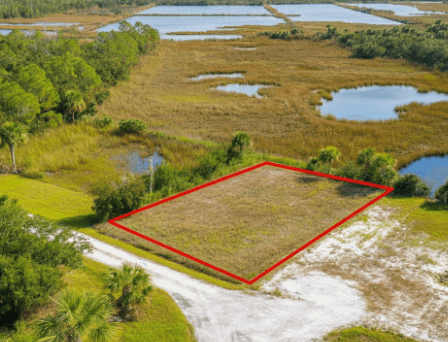When it comes to real estate, understanding the nuances of property laws is crucial, particularly in unique situations such as selling landlocked property. This blog will delve into the complexities surrounding whether it is legal to sell landlocked property in Florida. We’ll explore the specific legal frameworks and considerations that come into play, helping potential sellers navigate this often-overlooked aspect of real estate transactions. By the end, you’ll have a clearer insight into the question of “Is it legal to sell landlocked property in Florida?” and its implications for your property dealings.
In navigating the complexities of landlocked property sales, real estate investors like Steve Daria and Joleigh have critically examined Florida’s local laws and regulations. Their expertise highlights the importance of understanding access rights and potential easements that may affect the sale of such properties. By sharing their insights, they aim to empower potential sellers with the knowledge to make informed decisions regarding landlocked assets.
What Does It Mean to Have Landlocked Property?
A landlocked property refers to a piece of land that is completely surrounded by other parcels and lacks direct access to public roads or highways.
This means that the property is entirely encircled by neighboring properties, and reaching it requires traversing through other people’s land.

This lack of direct access can pose significant challenges, such as difficulties in obtaining utility services, managing property maintenance, and addressing legal issues related to access rights.
The Legal Definition
In legal terms, a landlocked property lacks an easement or right-of-way, which are pathways granted through neighboring properties to ensure access.
Without these, the property is isolated and difficult to use effectively.
Common Examples
- A piece of farmland completely surrounded by other farms.
- A residential lot is enclosed by other homes with no street access.
- A forested area encircled by private property.
Get Started: Get Your Cash Offer Below…
We are direct land buyers. There are no commissions or fees and no obligation whatsoever. Start below by sharing where your property is and where we can send your offer…
Legal Challenges in Selling Landlocked Property
Is it legal to sell landlocked property in Florida? Selling a landlocked property in Florida involves several legal challenges.
These issues can deter potential buyers and complicate the sale process.
Easement Rights
One of the primary legal concerns is the establishment of easement rights.
An easement is a legal right to use another person’s land for a specific purpose, like accessing a road.
Without an easement, the property remains inaccessible.
Right of Access
In Florida, the law does provide some relief for landlocked property owners.
Under certain conditions, property owners can seek a court order to establish a right of access, often referred to as an easement by necessity.
This legal pathway requires proving that the landlocked status significantly impairs the property’s utility and value.
Potential Litigation
Disputes over easement rights and access can lead to lengthy and costly litigation.
Both buyers and sellers must be prepared for potential legal battles, which can further complicate the sale process.
Strategies for Overcoming Landlocked Property Challenges
Is it legal to sell landlocked property in Florida? Despite the hurdles, there are several strategies to effectively manage and sell landlocked properties in Florida.
Establishing an Easement
The most straightforward solution is to negotiate an easement with neighboring landowners.
This involves legal agreements that grant the right to cross their land to access the property.
Court-ordered Easement by Necessity
If negotiations fail, pursuing a court-ordered easement by necessity is a viable option.
This legal route ensures that the property gains the necessary access, making it more attractive to buyers.
Land Swaps
In some cases, land swaps with neighboring property owners can provide access.
This involves exchanging a portion of the landlocked property for a strip of land that connects to a public road.

Tips for Selling Landlocked Property
Selling a landlocked property requires careful planning and a strategic approach.
Here are some tips to help you succeed:
- Highlight Potential Uses: Despite its challenges, landlocked property can offer unique opportunities. Highlight potential uses such as farming, hunting, or recreational activities to attract niche buyers.
- Provide Detailed Information: Be transparent about the landlocked status and any existing easements. Providing detailed information helps build trust with potential buyers.
- Work with Real Estate Experts: Engaging with real estate agents with positive backgrounds and legal advisors can streamline the sale process. They can assist with negotiations, legal requirements, and marketing strategies.
Benefits of Selling Landlocked Property
While selling landlocked property can be challenging, it also offers several benefits.
- Potential for Higher Returns: With the correct strategies, landlocked properties can attract niche buyers willing to pay a good price for unique opportunities.
- Legal Resolutions: Establishing easements or winning court orders can significantly increase the property’s value and marketability.
- Community Development: Selling a landlocked property can contribute to community development by creating new access routes and increasing land use potential.
Frequently Asked Questions
Is it legal to sell landlocked property in Florida? Explore the most common queries:
How can I establish an easement for a landlocked property?
To establish an easement for a landlocked property, you can negotiate directly with neighboring landowners to secure a legal right of access across their land.
This involves drafting and signing a legal agreement that details the terms and conditions of the easement, which should be recorded with the county to ensure enforceability.
Alternatively, if negotiations are unsuccessful, you may seek a court-ordered easement by necessity, which involves a legal process where the court grants access rights based on the property’s need for a practical means of entry.
What if neighboring landowners refuse to grant an easement?
If neighboring landowners refuse to grant an easement, you may need to pursue a court-ordered easement by necessity as a legal remedy.
This process involves petitioning the court to establish an easement based on the argument that the landlocked property cannot be practically used or accessed without such a right.
To succeed, you must demonstrate that the lack of access severely impairs the property’s utility and value and provide evidence showing that the easement is essential for the property’s reasonable use and enjoyment.
Can a landlocked property be developed?
Yes, landlocked property can be developed, provided that access issues are resolved.
This typically involves establishing easements or other legal access rights.
Conclusion
Navigating the legal landscape of selling landlocked property in Florida can be complex, but it’s not impossible. By understanding the challenges and employing strategic solutions, you can successfully sell your landlocked property and unlock its full potential.
**NOTICE: Please note that the content presented in this post is intended solely for informational and educational purposes. It should not be construed as legal or financial advice or relied upon as a replacement for consultation with a qualified attorney or CPA. For specific guidance on legal or financial matters, readers are encouraged to seek professional assistance from an attorney, CPA, or other appropriate professional regarding the subject matter.
